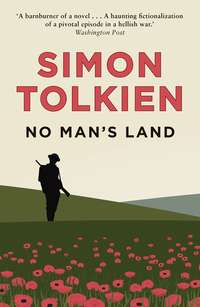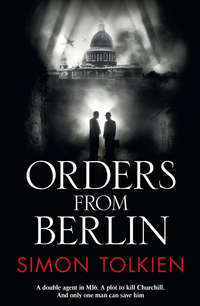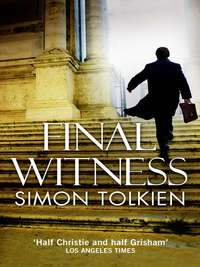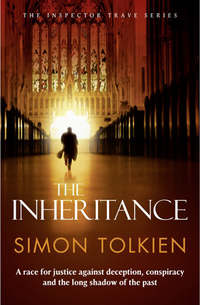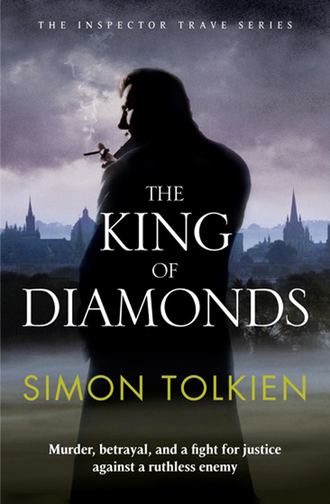
Полная версия
The King of Diamonds
Here comes a candle to light you to bed,
Here comes a chopper to chop off your head.
The words of the old nursery rhyme came unbidden into his head, and he smiled as he placed the candlestick carefully on the floor, put out his hand, and opened the door.
CHAPTER 7
Detective Inspector Trave woke with a start. He’d been deeply asleep, fighting the noise of the telephone ringing insistently beside his bed.
‘What is it?’ he asked blearily, still half-inhabiting the dream he’d been having: a bad dream that had been recurring lately in which shapeless shadows were coming toward him on a cliff’s edge and there was nowhere left to hide. His Dunkirk dream he called it, remembering 1940, when the world had gone up in flames. Who was to know if it wouldn’t happen again?
‘Sorry to wake you, sir,’ said a young, brisk voice on the other end of the line. ‘It’s a murder: young female shot in the head. At a place called Blackwater Hall. It’s outside Blackwater village on the London Road.’
‘Blackwater Hall,’ Trave repeated, coming fully awake.
‘Yes, that’s right. Do you want directions? I’ve got them here.’
‘No, I know Blackwater Hall. Get hold of Adam Clayton for me, will you? Tell him to meet me there.’
‘He’s already on his way, sir. He was on night duty when we got the call.’
‘Good. Thanks,’ said Trave, replacing the receiver.
Homicide at Blackwater Hall. It wasn’t the first time he’d heard those words. And people aren’t murdered in the same place twice for no reason, he thought as he got dressed, made himself a triple-strength cup of coffee, drank it in three gulps, and went out into the night.
Trave drove quickly through the empty streets and out into the dark countryside while his mind raced, remembering people and events that he’d been trying for a long time to forget. It was like the door of a lumber room had finally given way under the weight of what was stacked up behind it. Images from the past passed quickly in front of his mind’s eye like a succession of ghosts – Ethan Mendel lying dead, with the lake water lapping around his dark hair and his outstretched arms; David Swain’s hollow face collapsing in on itself as the jury foreman announced the guilty verdict; Titus Osman’s smug eyes twinkling behind his manicured beard as he entertained his guests at that dinner party after the trial, with Vanessa sitting on his left, listening to the bastard’s tall tales with such rapt attention.
Why had he taken Vanessa that night? Trave asked himself the same useless question for the thousandth time. Useless because he knew the answer. He hadn’t wanted to go. The Mendel case had left him feeling obscurely dissatisfied, a viewpoint evidently not shared by the jurors, who had taken less than two hours to convict. But Creswell, his boss, had insisted, and Trave had taken Vanessa with him to Blackwater Hall because he didn’t want to go on his own and because he felt guilty that she never went out; that he’d not been able to help her at all through those long, hard months and years after their son, Joe, died. Trave had had his job to fall back on, but she’d had nothing. Just him, and he’d been no support, worse than no support in fact. They’d grieved soundlessly and separately, trying to avoid each other in the passages and corridors of their empty house until their marriage withered away and died. Not with a shout; not even with a whimper. In a cold and weary silence.
He and Vanessa were finished long before the night that he took her to Osman’s to celebrate the end of another successful case. He realized that now. And yet she had looked so delicate, so fragile, that evening in a white dress that she hadn’t worn in years. He remembered her laughing in the bedroom before they left, saying that perhaps losing weight wasn’t such a bad thing after all, and he remembered how she’d bent her head to allow him to fasten the faux pearl necklace that he’d bought her as a present twenty years earlier, after Joe was born. His hands on her neck replaced by Osman’s hands – Osman, who could afford to pay more for a necklace than Trave earned in a year. Trave shuddered, braking hard to avoid the line of police cars with flashing lights parked in a line on the road up ahead. They must be searching the woods, he thought, as he turned through the open gate and drove up between the tall, moonlit trees to Osman’s house.
Clayton was waiting for him in the entrance hall. The whole place was ablaze with lights, and there was the sound of people running up above, although the hall itself was temporarily empty except for a uniformed policeman standing guard outside the closed door of the drawing room. It was a room that Trave vividly remembered from his previous visits to Blackwater Hall, when he was investigating Ethan Mendel’s murder. The views across the gardens and the woods to Blackwater Lake were among the most beautiful he’d seen from any house in the county. But for now the drawing room could wait; he had other business to attend to.
‘Where is she?’ he asked, dispensing with any greeting. He was a man in a hurry tonight.
‘Who?’ asked Clayton, thrown off balance for a moment by the suddenness of the question.
‘Katya Osman. I assume she’s the young female shot in the head who’s brought us all out here tonight.’
‘Yes, that’s right. She’s in her bedroom up on the top floor. It looks like she was shot while she was asleep. The owner’s in there,’ said Clayton, pointing to the door of the drawing room on the other side of the hall. ‘With the other two residents: Mr Claes and his sister.’
‘They can wait,’ said Trave curtly, making for the stairs.
‘They say it’s a David Swain who broke in here and killed her,’ said Clayton, running to catch up with his boss.
‘He can’t have done. He’s in gaol serving a life sentence. I’m the one who put him there.’
‘I know. They’re saying he’s escaped.’
‘How?’
‘I don’t know. I’ve got Samuels making enquiries. Mr Osman thinks he was transferred back to Oxford Prison earlier this year.’
‘Oh, he does, does he? How do you know about Swain?’
‘Well, everyone was talking about his trial at the station a couple of years back when I first got posted down here. About him and this girl and the Belgian bloke he knifed – a sort of love triangle gone wrong is what I heard.’
‘You could call it that, I suppose,’ said Trave with a grimace, thinking of his own situation.
‘So when they mentioned Swain down there, I remembered that this was the place. Where it happened, I mean.’
‘Well, good for you,’ said Trave. He could feel the anger growing inside his chest as they got closer to the top floor, but lashing out at his subordinate didn’t make him feel any better. It was a useless anger born out of years of frustration. In his experience most murders could have been prevented before they happened, but by the time he arrived on the scene it was always by definition too late. He could find the killers and get them locked up in a cell somewhere, but he couldn’t bring the dead back to life.
And it was worse when he knew the victim and she was young like Katya Osman, he thought, as he stood beside her bed, looking down at her pale, ravaged, pretty face, at the neat little hole in the centre of her forehead rimmed crimson with her dried-up blood.
Bedrooms were private places; in bed you were supposed to be safe, inviolate, free from the attentions of the bogeyman. ‘Matthew, Mark, Luke, and John guard the bed that I lie on.’ He remembered the prayer from his childhood: his mother’s voice intoning the words in the semi-darkness; his voice following hers. But no one had guarded Katya’s bed when it mattered. No one had been there to protect her.
It was unbearable. Trave swallowed and closed his eyes hard, feeling for a moment like one of those parents that he had to take down to the hospital morgue from time to time to identify the remains of their dead child. And yet his days as a parent were over. He was a policeman now. That was what was left to him. He looked down again at the dead girl on the bed, past her sunken cheeks and into her unseeing blue eyes. He remembered Katya’s eyes. They had been her best feature. Large and luminous, eyes a young man could fall into. But now the light had gone out of them and they stared sightless up at the ceiling.
‘You were wrong about her being asleep, Adam,’ he said without turning around. ‘She saw whoever it was before she died. She saw the gun. She wasn’t spared a thing. She knew.
‘If the eye was like a camera and we could just unroll the film,’ he went on musingly, talking to himself as he leant over and closed Katya Osman’s eyes forever.
He was about to turn away, but something made him linger, picking up the girl’s hand from where it lay, lifeless, on the coverlet.
‘Look at that,’ he said, beckoning Clayton over to join him at the bedside.
‘What, sir?’
‘Her nails. They’re bitten down to the quick. And she must weigh half of what she did when I last saw her,’ he added, pulling back the quilt to expose Katya’s upper body.
‘Close to malnutrition I’d say,’ said a voice behind him. It was Davis, the police doctor, standing behind them in the doorway, dressed in his own personal uniform of brown corduroy jacket and silk bow tie. The outfit never changed – in all the years he’d known him, Trave couldn’t recall ever seeing Horace Davis wear anything else.
‘Not the first time we’ve run across each other here after hours, Bill,’ said the doctor drily, taking Trave’s place beside the dead girl.
‘No,’ said Trave. They were alone now. Clayton had left the room to talk to a uniformed policeman who’d been waiting outside in the corridor for some time, trying to attract his attention.
‘Who is she?’ asked the doctor.
‘Katya Osman. She is or was the girlfriend of the corpse you were here for last time.’
‘And them?’ asked Davis, nodding toward the photograph that Trave had idly picked up from the top of the bookcase: a laughing woman with a scarf around her head holding on to the arm of a bald-headed man wearing an old suit and round-rimmed glasses; behind them the sea and a sense that the wind was blowing them off balance.
‘Her parents.’
‘How do you know?’
‘I asked her about them before. She showed me the photograph.’
‘And where are they now?’ asked the doctor, continuing his examination of the dead girl as he carried on the conversation.
‘Dead. In the war. I don’t know how.’
Davis looked up, picking up on the bitterness in Trave’s voice.
‘Different, this one, is it?’ he asked.
Trave put back the photograph, saying nothing, but Davis nodded as if he understood.
‘She was beautiful,’ he said, looking down at Katya. ‘It’s a waste. That’s what it is. A bloody awful waste.’
He turned away from the bed, resuming his professional air as he snapped his battered old medical bag shut.
‘She’s been dead just over an hour, so I’d put the time of death at about half past twelve, give or take a few minutes. And whoever did it knew what they were doing, although I suppose that’s obvious,’ he added, pointing to the wound in the centre of Katya’s forehead.
‘Oh, and you should also take a look at this,’ he said, beckoning Trave back over and pulling up Katya’s left sleeve to expose the puncture marks above the elbow. ‘She’s been injecting or someone else has been doing it for her.’
‘Are any of those from tonight?’ asked Trave.
‘I don’t know. But the autopsy’ll tell us. I’ll let you know. I hope you catch the bastard, Bill,’ Davis added, looking back for a moment as he went out of the door. ‘Whoever did this isn’t one of our usual punters.’
‘No,’ said Trave to himself. ‘No, that he’s not.’
Clayton waited patiently while Trave stood over by the window, looking out into the night. There were other things he needed to explain, including the news he’d just heard outside, but he knew better than to interrupt his boss while he was lost in a train of thought.
‘Something’s been happening in here,’ said Trave without turning round.
‘Happening, sir?’ Clayton repeated, sounding mystified. Of course something had happened. A young woman had been shot in the head.
‘It’s too damned tidy. I remember when I went round the house after the Mendel murder, this room didn’t look anything like it does now. Everything was strewn about everywhere: clothes, makeup, magazines, books – you name it. A typical girl’s bedroom. This is like a room in a hospital. Or a gaol,’ he added, taking hold of the steel bars over the windows with his hand. ‘What the hell are these for, I wonder?’
Clayton had no idea.
‘All right, so tell me about Swain. Anything new?’ asked Trave, turning back from the window with a sigh.
‘Yes, he’s definitely escaped. And it was from Oxford Prison. Samuels got through to them a few minutes ago. Swain’s with a man called Earle, apparently. They got over the wall.’
‘Earle. Eddie Earle?’
‘Yes, that’s right. Edward James Earle. Doing five years for deception,’ said Clayton, glancing down at the piece of paper in his hand. ‘Do you know him?’
‘Yes, I know him. He’s a confidence trickster, quite a good one, specializes in conning old ladies out of their life savings. Easy Eddie he likes to be called – easy with other people’s money.’
‘They had help,’ said Clayton. ‘Apparently someone threw rope ladders over the perimeter wall, and they think there was a getaway car.’
‘How long ago? Have you got a time?’
‘Just after midnight. They’d have had time to get here, sir.’
‘I know,’ said Trave. It made no sense but Clayton thought he sounded disappointed.
‘All right,’ Trave went on after a moment. ‘So where are they now?’
‘Earle, I don’t know. No one’s seen him as far as I know. And I’m pretty sure Swain’s not in the house. I’ve had the place searched from top to bottom. But he could be somewhere out in the grounds. I’ve got people looking, but it’s difficult in the dark. To be sure, I mean. And he may be wounded. We don’t know.’
‘Wounded?’
‘Yes. The owner’s brother-in-law, Franz Claes, says he fired two shots at him in the corridor out there. The first one hit the door and the second one hit the wall at the far end, just by the turning to the stairs, but it may have touched Swain on the way. It was too dark for Mr Claes to see, apparently. But the bullet holes match his story.’
‘We’ll need to get ballistics to compare the bullets with the one over there,’ said Trave, pointing at Katya. ‘Not that I’m holding my breath.’
‘Sir?’
‘Nothing. Don’t worry about it. How did Swain get in?’
‘He broke the window in the study downstairs, and I reckon that’s how he got out too. All the other doors and windows seem to have been locked when we got here. Oh, and he tore his clothes on the rosebushes outside. There’s a bit of shirt we’ve recovered. Blue-and-white stripe, like prison uniform. I’ll have it checked out.’
‘Anything missing?’
‘Can’t be sure yet, but the owner hasn’t noticed anything, except a silver candlestick that the intruder took upstairs from the dining room, to light his way. He left it outside the door before he came in here. I’ve got it being dusted for fingerprints. And the study too, sir. Photographs as well.’
‘Good. You’ve been very professional, Adam. Just what I would have hoped. Well, I suppose we’d better go and talk to our friends downstairs. See what their story is,’ said Trave, making for the door.
Clayton felt pleased. He didn’t often get praise from his boss, so when it came, it was worth savouring. But he also felt uneasy. There was something Trave wasn’t telling him, he thought, as they went downstairs. In normal circumstances he’d have expected the inspector to have a modicum of sympathy for the owner and his family after what they’d just been through, but instead, Trave’s attitude seemed to be bordering on hostile before he’d even clapped eyes on them.
‘Who do you want to see first?’ asked Clayton once they were back in the hall. ‘There are just three of them – the owner and his brother-in-law and sister-in-law. No servants – none of them live in apparently.’
‘Claes – the one with the gun,’ said Trave immediately. ‘Doesn’t he say he was the first one on the scene?’
Clayton nodded and was halfway to the drawing room door when Trave’s voice stopped him in his tracks.
‘Wait. We haven’t decided where to interview them yet. Where’s more important than the order they go in right now.’
‘You don’t want to interview them where they are?’ asked Clayton, looking puzzled.
‘Osman? No, anywhere but in there. That’s his lord-of-the-manor room.’
‘His what?’
‘The place where he struts about entertaining high society, feeling like a million dollars. No, we need to put him on edge, put him at a disadvantage when we talk to him.’
Trave stroked his chin musingly, and Clayton kept quiet. None of this made much sense as far as he was concerned. The training book said you should put witnesses at ease in order to get as much out of them as possible, not put them through the third degree. Unless they were suspects, of course, but Titus Osman wasn’t that. If anything, he was a victim. His niece had just been murdered, for God’s sake. However, Clayton knew better than to question his boss’s methods. Trave was the best detective on the Oxford force when it came to getting results.
‘What about Osman’s study?’ Trave asked, looking up. ‘Are forensics still working in there?’
‘Yes. I told them to start downstairs so you and the doctor could see the deceased first. I hope that was right?’
‘Yes, no problem,’ said Trave distractedly. ‘But tell them to finish in the study before they go anywhere else. We’ll interview Claes and his sister in the drawing room, and then see Osman in the study when forensics are done in there. We may have to wait a bit but that doesn’t matter.’
Franz Claes sat bolt upright on the edge of the sofa, facing Trave and Clayton, who sat side by side on the matching sofa opposite. The empty fireplace was between them. Claes was short, no higher than five foot two or three, and his forward position meant that he could at least keep his feet on the floor, although Clayton felt that Claes would have preferred a straight-backed wooden chair to the comfort of the sofa in any event. He was that type of man.
‘When did you get dressed, Mr Claes?’ asked Trave.
‘After calling the police and making sure Swain was no longer in the house.’
It was a strange first question to ask, thought Clayton, but Claes didn’t appear surprised by it. He seemed alert, ready for anything that might be thrown at him. And to be fair, Clayton had been surprised too when Claes had answered the door dressed semi-formally as he was now, in blazer, starched white shirt, and trousers, with not a hair out of place. He even looked as if he had shaved. His cheeks were entirely smooth and hairless even though it was the middle of the night.
‘And so you were the first to see Mr Swain?’ Trave continued.
‘Yes, I heard him as he went past my bedroom door. It was slightly open.’
‘It’s on the first floor as I recall,’ said Trave.
‘Yes, at the opposite end of the corridor to Mr Osman.’
‘Why do you call him Mr Osman? He’s your brother-in-law, isn’t he?’
‘Titus then,’ said Claes, nodding as if he had lost an insignificant point in a game that had barely begun. ‘As I say, I heard a noise. My light was off but I had not yet fallen asleep, and so I got up and went outside.’
‘Wearing?’
‘Pyjamas. I took my gun with me.’
‘And where was that? Do you sleep with it under your pillow, Mr Claes?’
‘It was in the top drawer of my desk,’ said Claes, apparently unruffled by the close questioning. His English was surprisingly good, thought Clayton. He spoke slowly and with an accent, but he was clearly fluent.
‘Is this the gun?’ asked Trave, holding up a Smith and Wesson revolver now neatly packaged in a see-through plastic bag.
‘Yes.’
‘And you’ve got a licence for it, have you?’
‘You know I have, Inspector. It’s the same gun I had two years ago. It’s not the first time we’ve discussed it, you know,’ said Claes with a half-smile. It was not an attractive smile, thought Clayton. It was partly the way in which the tightening of Claes’s facial muscles threw into sharper relief the ugly scar that ran down the left side of his face, but it was also because there was no warmth in the man. His eyes were cold too, grey and watchful and somehow disconnected.
Trave had been quiet for a moment, but now he pursed his lips as if coming to a decision.
‘All right, Mr Claes. You tell us what happened in your own words. I’ll try not to interrupt you.’
‘Thank you,’ said Claes with a nod. ‘Once outside my room I heard someone walking on the floor above, and so I climbed the stairs and looked around the corner. There was a candle burning on the floor outside Katya’s room. It’s about halfway down the corridor on the left-hand side. Her door was half-open and the light was on inside. It was then that I heard the shot. Almost immediately a man came out. I could see it was Swain. I recognized him from when I stopped him before down by the lake, and from his trial. He was standing still for a moment, and I shot at him, but he saw me and ducked back behind the door. And immediately he ran away down to the end of the corridor, toward the other set of stairs, and I fired again, but I don’t know whether I hit him or not. And then he disappeared.’
‘What was he wearing?’ asked Clayton, speaking for the first time.
‘A blue-and-white shirt, some jeans maybe. I’m not sure about the trousers.’
‘Were the clothes torn?’
‘I don’t know. There was no time to see things like that.’
Trave looked at Clayton impatiently, drumming his fingers on his knee as Clayton made a note in his report book.
‘So Mr Swain disappeared,’ Trave said, leaning forward. ‘Did you follow him?’
‘Yes, but not to catch him up. It would have been impossible: he was running and I have a problem with my leg’ – Claes tapped his left knee – ‘so I shouted down to Titus to warn him, and then I went downstairs myself. Titus was in the corridor outside his bedroom. We looked down here and it seemed like Swain was gone, so we went back up to Katya’s room.’
‘Together?’
‘No, Titus went first. I looked in all the rooms first because I wanted to make sure Swain wasn’t hiding somewhere.’
‘What would you have done if you’d found him?’
‘Whatever was necessary, of course,’ said Claes. There was a cold, clipped tone to his voice that Clayton found oddly disconcerting, chilling even.
‘And so when you didn’t find him, you went back upstairs and found Miss Osman shot in the head. How did that make you feel, Mr Claes?’ asked Trave.
Claes didn’t answer for a moment. It was as if he was nonplussed by the question, as if he’d prepared himself to say what had happened but not how he felt about it. Clayton didn’t think that Claes was the type of man who spent much of his life discussing his feelings.
‘I was sorry. Of course I was sorry,’ he said slowly. ‘But there was nothing I could do.’
‘No, there wasn’t, was there?’ said Trave, sounding unconvinced. ‘Miss Osman hasn’t exactly been a high priority in this house recently, has she?’
‘I don’t understand.’
‘The doctor says she’s badly undernourished; she’s got puncture marks all the way up one arm; and there are steel bars on her windows. What have you got to say about that, Mr Claes?’
‘She had got herself into trouble in the town,’ said Claes, choosing his words carefully. ‘My brother-in-law was looking after her, but she was unwilling.’
‘Unwilling?’
‘Yes, often she would not eat. She was not grateful.’
‘Grateful! For being kept a prisoner in her own home?’
Claes shrugged his shoulders.
‘Why did you try to shoot Mr Swain?’ asked Trave, changing the subject.


